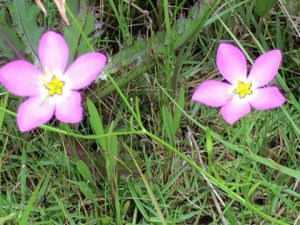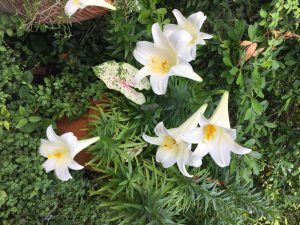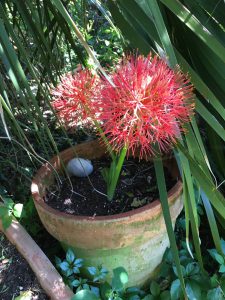Bulbs can be grown in yards throughout Florida, but they are not the traditional tulips and daffodils you would find in northern climates. Plant your bulbs in sun to partial sun locations in spring, summer, or fall, depending on the type of bulb you are growing.
These caladiums prefer dappled to deep shade. Some will even grow in full sun. They are planted in the ground at Bok Tower Gardens, but will grow well in containers. They die back in the winter, but can be left in the ground to reemerge in the spring. 
Rain lilies will grow both in pots and in the ground – if planted in the lawn, be careful not to cut off the leaves they need to provide energy for the next bloom. The flowers are triggered by the first rain after a dry period, and they will naturalize freely. They prefer sun, but will grow in dappled shade.
Easter lilies grow best in dappled shade and rich soil. They will multiply freely if planted in large pots.
Blood lilies are an old pass-along plant, shared from neighbor to neighbor, although they are occasionally sold in stores. They need deep shade and multiply freely, dying back in the winter. I grow mine in pots to protect them from snails. Watch out for lumber grasshoppers, too.
These are just a few of our favorite bulbs to grow in Florida, but there are many more.
This blog post was written by Master Gardener Volunteer Celia Beamish under supervision of the Master Gardener Volunteer Coordinator and Residential Horticulture Agent Anne Yasalonis.
For more information, contact UF/IFAS Extension Polk County at (863) 519-1041 or visit us online at http://sfyl.ifas.ufl.edu/polk. The Plant Clinic is open Monday-Friday, 9:00 am-4:00 pm to answer your gardening and landscaping questions. Visit us in person, give us a call, or email us at polkmg@ifas.ufl.edu.
If you are not in Polk County, Contact your local UF/IFAS Extension Master Gardener Volunteer Plant Clinic.
The Florida Master Gardener Volunteer Program is a volunteer-driven program that benefits UF/IFAS Extension and the citizens of Florida. The program extends the vision of the University of Florida/Institute of Food and Agricultural Sciences, all the while protecting and sustaining natural resources and environmental systems, enhancing the development of human resources, and improving the quality of human life through the development of knowledge in agricultural, human and natural resources and making that knowledge accessible.
An Equal Opportunity Institution.
 1
1
